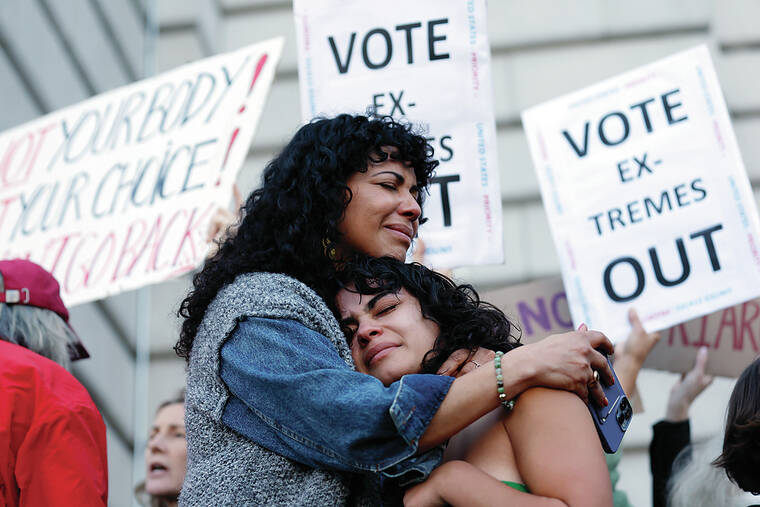Supreme Court’s abortion ruling sets off new court fights
NEW ORLEANS — Judges temporarily blocked abortion bans Monday in Louisiana and Utah, while a federal court in South Carolina said a law sharply restricting the procedure would take effect there immediately as the battle over whether women may end pregnancies shifted from the nation’s highest court to courthouses around the country.
The U.S. Supreme Court’s decision Friday to end constitutional protection for abortion opened the gates for a wave of litigation. One side sought quickly to put statewide bans into effect, and the other tried to stop or at least delay such measures.
ADVERTISING
Much of Monday’s court activity focused on “trigger laws,” adopted in 13 states that were designed to take effect swiftly upon last week’s ruling. Additional lawsuits could also target old anti-abortion laws that were left on the books in some states and went unenforced under Roe. Newer abortion restrictions that were put on hold pending the Supreme Court ruling are also coming back into play.
“We’ll be back in court tomorrow and the next day and the next day,” Nancy Northup, president and CEO of the Center for Reproductive Rights, which argued the case that resulted in the high court ruling, said Friday.
Rulings to put trigger laws on hold came swiftly in Utah and Louisiana.
A Utah judge blocked that state’s near-total abortion ban from going into effect for 14 days, to allow time for the court to hear challenges to the state’s trigger law. Planned Parenthood had challenged the law, which contains narrow exceptions for rape, incest or the mother’s health, saying the law violates the equal protection and privacy provisions in the state constitution.
“I think the immediate effects that will occur outweigh any policy interest of the state in stopping abortions,” Utah Judge Andrew Stone said.
In Louisiana, a judge in New Orleans, a liberal city in a conservative state, temporarily blocked enforcement of that state’s trigger-law ban on abortion, after abortion rights activists argued that it is unclear.
The ruling is in effect pending a July 8 hearing.
At least one of the state’s three abortion clinics said it would resume performing procedures on Tuesday.
“We’re going to do what we can,” said Kathaleen Pittman, administrator of Hope Medical Group for Women, in Shreveport. “It could all come to a screeching halt.”
Louisiana Attorney General Jeff Landry, a Republican and staunch abortion opponent, vowed to fight the judge’s ruling and enforce the law.
“We would remind everyone that the laws that are now in place were enacted by the people through State Constitutional Amendments and the LA Legislature,” Landry tweeted Monday.
In South Carolina, a federal court lifted its prior hold on an abortion restriction there, allowing the state to ban abortions after an ultrasound detects a heartbeat, usually around six weeks into a pregnancy, before many women know they are pregnant. There are exceptions if the woman’s life is in danger, or if the pregnancy is the result of rape or incest.
Planned Parenthood said after the ruling that it will continue to perform abortions at its South Carolina clinics within the parameters of the new law.
Also Monday, abortion rights advocates asked a Florida judge to block a new law there that bans the procedure after 15 weeks with some exceptions to save a mother’s life or if the fetus has a fatal abnormality, but no exceptions for rape, incest or human trafficking.
The ACLU of Florida argued that the law violates the Florida Constitution. A ruling on that is expected Thursday — a day before the law is scheduled to take effect.
Abortion rights activists also went to court Monday to try to fend off restrictions in Texas, Idaho, Kentucky and Mississippi, the state at the center of the Supreme Court ruling, while the American Civil Liberties Union of Arizona filed an emergency motion there on Saturday seeking to block a 2021 law they worry can be used to halt all abortions.
In Friday’s ruling, the Supreme Court left it to the states to decide whether to allow abortion.
“The expectation is that this will result in years of legislative and judicial challenges,” said Jonathan Turley, a professor at the George Washington University law school.
As of Saturday, abortion services had stopped in at least 11 states — either because of state laws or confusion over them.


